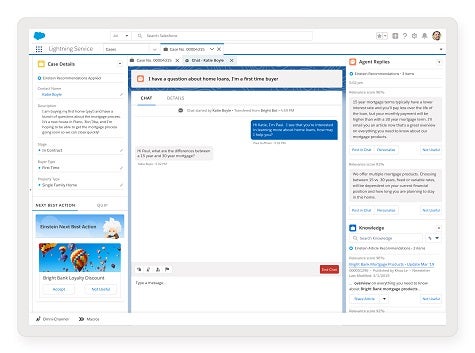Salesforce is continuing its campaign to automate customer service tasks by injecting both artificial intelligence (AI) capabilities and enhanced collaboration capabilities into its Service Cloud platform.
Martha Walchuk, senior director of product marketing for Service Cloud, says a forthcoming instance of Service Cloud will add additional capabilities such as reply recommendations, article recommendations, next best actions, and case routing that will be surfaced using the machine learning algorithms Salesforce has embedded in its Einstein AI platform.
At the same time, Salesforce has announced it has integrated its Quip document sharing and collaboration service with Service Cloud.
Walchuk says Salesforce is not trying to eliminate the need for customer service representatives using AI. Rather, Walchuk says the goal is to leverage AI to automate a wide variety of routine tasks that ultimately conspire to make customer service representatives less productive.
“We want to augment the customer service representatives,” says Walchuk. “We want to help them become experts.”
That expertise issue has become a major problem as companies continue to expand their product portfolios. It’s not feasible for most organizations to hire additional customer service representatives to service an increasingly complex product portfolio, says Walchuk. AI platforms such as Einstein make it possible for customer service representatives to leverage machine learning algorithms to identify what actions they should recommend to a customer to address a wide range of potential issues, says Walchuk.
There’s clearly a trend toward trying to push as many customers as possible to interacting with bots online to resolve their support issues. But the more complex the issue, the less likely it is those bots will be able to address it. That means that despite all the hype surrounding AI, the need for customer service desks is not going to go away any time soon. For now, AI platforms for the foreseeable future are confined to automating a very well-defined set of narrow tasks.
In the meantime, however, AI does provide an opportunity to reduce the notoriously high rate of employee turnover in the customer service department. After all, one of the primary reasons this problem exists is that not being able to provide a helpful answer becomes too frustrating even for the customer service representative with the sunniest of dispositions. AI platforms that reduce that frustration will at the very least pay for themselves by reducing customer service hiring and training costs. What AI, however, won’t do on its own is make the customer happy.



